
Further to last week’s announcements, Peter Hull, Commercial Director for H&H Land and Property here explains the regulations set out in the Government’s countryside stewardship manual stating that all farmers and landowners will be forced to erect billboards publicising the fact that they have received EU grants, or face having the money claimed back under new regulations proposed by the EU.
The new regulations have led to warnings that farmers are being forced to become part of the EU propaganda machine in the run up to the referendum on Britain’s membership.
Under the proposals those who receive more than £388,250 from the Countryside Stewardship scheme, part of the Common Agricultural Policy will have to display a 6’ x 4’ billboard “at a location readily visible to the public”. For smaller awards the size of the billboard is reduced, but the recipients of the grant must meet the costs of the signs themselves.
The Countryside Stewardship Scheme awards cash to landowners and farmers to improve the countryside by planting trees, protecting heath land or restoring lakes or other natural features.
Peter says: “The initial reaction of many is that the signs will blight the countryside, and give the impression that farmers are supporters of the EU. It is currently unclear whether the signs would require planning permission.
“It is an uncomfortable position for farmers. Traditionally they do not receive positive press coverage and have kept many good news stories to themselves, while the media often portray them as pillages of the countryside.”
This could become an opportunity for UK agriculture. With over 70% of UK farmland in an environmental scheme, equating to 7.4 million hectares; the need to explain how agriculture benefits everyone in the UK becomes more important.
Peter goes on to say: “It is vital that the public understand where their food comes from; the journey is not simply from a supermarket shelf to their plate. Farmers do care about the countryside and it is important to publicise the good work being done across the UK, to grow the food required, within the cost base expected by customers.
“Of every bag of shopping sold by a supermarket it is estimated that 30% is thrown away. With farmers being under ever increasing pressure to produce more food for a growing population, and with customers demanding higher assurance standards at lower cost, it is difficult to comprehend such levels of waste, while being placed under such tight financial pressures.”
The original objectives of the Common Agricultural Policy were clearly defined as providing plentiful, affordable food to the population of the member states – not as now perceived a golden handout to farmers. It is time to reconnect with the original UK aims and objectives as they still remain relevant today.
By highlighting the good work done by UK farmers in providing traceable, quality, nutritious food and allowing British people to understand more about the environment, and how their choices can make a difference are to be encouraged and should not become a part of a propaganda war over the wider EU debate.
